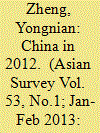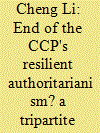| Srl | Item |
| 1 |
ID:
119103


|
|
|
|
|
| Publication |
2013.
|
| Summary/Abstract |
For China, the year 2012 was politically significant with a once-a-decade power transfer taking place. However, the year was full of political scandals and rumors. From the top elite circles to the grassroots, Chinese feel increasingly anxious and frustrated. This paper examines what has gone wrong with China's elite politics, and how Chinese social groups have responded.
|
|
|
|
|
|
|
|
|
|
|
|
|
|
|
|
| 2 |
ID:
119179


|
|
|
|
|
| Publication |
2012.
|
| Summary/Abstract |
This essay challenges the widely held view of the CCP's purported "resilient authoritarianism," which asserts that China's one-party political system is able to enhance the state capacity to govern effectively through institutional adaptations and policy adjustments. An analysis of the recent and still unfolding Bo Xilai crisis reveals the flaws in China's political system, including nepotism and patron-client ties in the selection of leaders, rampant corruption, the growing oligarchic power of state-owned enterprises, elites' contempt for the law and the potential failure to broker deals between competing factions in the Party leadership. The essay argues that the CCP's "authoritarian resilience" is a stagnant system, both conceptually and empirically, because it resists much-needed democratic changes in the country. The problems of the resilient authoritarianism thesis is traceable to the monolithic conceptualizing of China - the failure to appreciate seemingly paradoxical transformative trends in the country, which this essay characterizes as three paralleled developments, namely, 1) weak leaders, strong factions; 2) weak government, strong interest groups; and 3) weak Party, strong country. One should not confuse China's national resilience (in terms of the emerging middle class, new interest group politics, and dynamic society) with the CCP's capacity and legitimacy to rule the country. The essay concludes that if the CCP intends to regain the public's confidence and avoid a bottom-up revolution, it must abandon the notion of "authoritarian resilience" and embrace a systematic democratic transition with bold steps towards intra-Party elections, judicial independence and a gradual opening of the mainstream media.
|
|
|
|
|
|
|
|
|
|
|
|
|
|
|
|